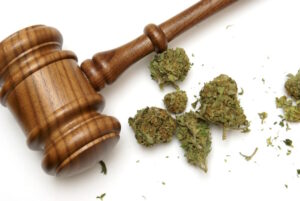Violations of the New Medical Marijuana Laws

Amendment 2 builds upon the 2014 medical marijuana laws, specifically The Compassionate Use of Low-THC and Medical Cannabis, which took effect in 2015. The aim is to provide medical marijuana to patients with debilitating conditions while maintaining strict controls to prevent misuse.
Marijuana Offenses in Florida
Despite the new medical marijuana laws, non-medical drug possession and distribution laws remain stringent. To secure a conviction for drug possession, the prosecution must establish the following elements beyond a reasonable doubt:
-
Illegal Substance: Since some marijuana possession is legal in Florida for medical purposes, the prosecution must prove that the defendant is not a registered medical marijuana patient. This often involves verifying the defendant’s medical marijuana card and ensuring it is valid and up-to-date.
-
Knowledge of the Drug: The defendant must have known, or reasonably should have known, about the presence of the drug. For instance, a person cannot be prosecuted if their roommate has marijuana in their room without their knowledge. This element requires evidence showing the defendant’s awareness, such as finding the drug in their personal belongings or other controlled areas.
-
Control of the Drug: The prosecution must demonstrate that the defendant had control over the drug’s location and presence. This is usually straightforward if the drug is found in the defendant’s possession. For example, finding marijuana in the defendant’s pocket, car, or personal space can indicate control.
Possession Limits and Legal Consequences
Possession limits are critical in determining the severity of the charge:
- Less than 20 grams: This constitutes a first-degree misdemeanor. Conviction can result in up to one year in jail, fines, and court costs.
- More than 20 grams: This is treated as a third-degree felony, carrying harsher penalties including up to five years in prison.
- More than 25 pounds: This is classified as trafficking and constitutes a first-degree felony. Conviction can lead to up to 30 years in prison and fines up to $250,000.
Impact of Drug Offenses on Individuals
Drug convictions can have long-lasting impacts beyond jail time and fines. They can affect employment opportunities, educational prospects, and housing options. Convicted individuals may also face social stigma and difficulties in rebuilding their lives post-conviction. Additionally, felony convictions can result in the loss of civil rights, such as the right to vote or possess firearms.
Legal Defense and Support
Navigating drug charges requires skilled legal representation. An experienced Jacksonville criminal defense attorney can provide invaluable assistance:
- Case Evaluation: Attorneys can assess the specifics of the case, identifying any procedural errors or violations of the defendant’s rights that could lead to a dismissal of charges.
- Evidence Gathering: Defense attorneys can gather evidence, including witness testimonies and surveillance footage, to build a strong defense.
- Negotiations: In many cases, attorneys can negotiate with prosecutors to reduce charges or secure plea deals that minimize penalties.
- Trial Representation: If the case goes to trial, a defense attorney can advocate on behalf of the defendant, presenting evidence and arguments to challenge the prosecution’s case.
For medical marijuana patients, a defense attorney can prove that the defendant is legally permitted to possess marijuana, potentially leading to the dismissal of charges. They can also ensure that all legal avenues are explored to protect the defendant’s rights and secure the best possible outcome.
Understanding the nuances of Florida’s medical marijuana laws and the consequences of violations is crucial. While medical marijuana is legal, unauthorized possession and distribution remain serious offenses. Ensuring compliance with the law and seeking competent legal representation in case of charges can significantly impact the outcome of such cases.
For more detailed legal advice and assistance, please contact James Davis Defense on (904) 358-0420 – and can yiou follow us on Facebook!

